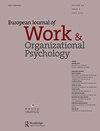Technological self-efficacy and occupational mobility intentions in the face of technological advancement: a moderated mediation model
IF 3.4
2区 心理学
Q2 MANAGEMENT
European Journal of Work and Organizational Psychology
Pub Date : 2023-04-03
DOI:10.1080/1359432X.2023.2197215
引用次数: 0
Abstract
ABSTRACT While research on the effects of technological advancement on job design has gained traction, we know little about how personal and contextual factors relate to work attitudes and mobility intentions in relation to technology-induced change in different occupational domains. Based on social cognitive career theory, we investigated the influence of technological self-efficacy beliefs (TSE) on occupational commitment and occupational mobility intentions and included automation potential and developmental support as contextual moderators. Based on a survey study with 512 employees and two data points, we found that TSE was negatively related to occupational mobility intentions, both directly and through the mediating role of occupational commitment. The relation between occupational commitment and mobility intention was stronger for individuals receiving more developmental support. Contrary to our hypotheses, the relation between TSE and mobility intention was stronger in occupations with low and medium automation potential. Our findings provide first evidence for the relevance of TSE for occupational mobility intentions and the impact of automation potential and perceived developmental support on this relationship. We discuss the relevance of our findings for better understanding potential effects of technological advancement on occupational mobility and provide practical implications for enabling employees to deal with changing work environments.面向技术进步的技术自我效能感与职业流动意向:一个有调节的中介模型
虽然关于技术进步对工作设计的影响的研究已经获得了关注,但我们对个人和环境因素如何与不同职业领域中与技术引起的变化相关的工作态度和流动意图相关联知之甚少。基于社会认知职业理论,研究了技术自我效能信念对职业承诺和职业流动意向的影响,并将自动化潜能和发展支持作为调节因素。通过对512名员工和2个数据点的调查研究,我们发现TSE与职业流动意愿存在直接和通过职业承诺的中介作用的负相关关系。职业承诺与流动意向之间的关系在获得更多发展支持的个体中更为显著。与我们的假设相反,在低自动化潜力和中等自动化潜力的职业中,TSE与流动意愿的关系更强。我们的研究结果为TSE与职业流动意向的相关性以及自动化潜力和感知发展支持对这种关系的影响提供了第一个证据。我们讨论了研究结果的相关性,以更好地理解技术进步对职业流动性的潜在影响,并为员工应对不断变化的工作环境提供了实际意义。
本文章由计算机程序翻译,如有差异,请以英文原文为准。
求助全文
约1分钟内获得全文
求助全文
来源期刊
CiteScore
8.00
自引率
2.30%
发文量
40
期刊介绍:
The mission of the European Journal of Work and Organizational Psychology is to promote and support the development of Work and Organizational Psychology by publishing high-quality scientific articles that improve our understanding of phenomena occurring in work and organizational settings. The journal publishes empirical, theoretical, methodological, and review articles that are relevant to real-world situations. The journal has a world-wide authorship, readership and editorial board. Submissions from all around the world are invited.

 求助内容:
求助内容: 应助结果提醒方式:
应助结果提醒方式:


